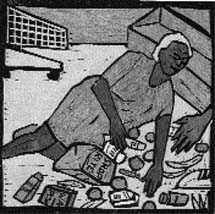Thirsty Thursday
may not be
thirsty enough
by Elliot McAdam
Remember the Grog Symposium in 1994, the
numerous community and long and controversial Liquor Commission hearings
in Tennant Creek? They ended in March 1996 with the Liquor Commission
putting new restrictions on the liquor licenses of the Tennant Creek
Hotel, Goldfields Hotel and the Headframe bottle shop. These restrictions
are now commonly, and generally fondly, referred to as 'Thirsty Thursday'.
The main changes on Thursdays were: no sales from front bars and no
take away sales. No changes were made to club or restaurant licences
whether, in-house or take aways. Other key changes were banning the
sale of wine in 4 or 5 litre casks and restricting sales of 2 litre
casks to one per person per day.
The previous Liquor Commissioner, John Maley, only agreed to these changes
after a six month trial which was split into two 3 month phases. Dr
Peter D'Abbs, in conjunction with the Living with Alcohol Program, conducted
an independent evaluation which demonstrated that the first phase was
an overwhelming success, - the second phase less so. The second phase
allowed front bar sales and take aways after 3 pm on Thursdays. This
was not enough to give the community a complete days break from the
cycle of drinking.
During phase 1 (Sept - Nov '95) the number of incidents by police on
Thursdays was 55% lower than in the year before, the number of patients
with alcohol as a reason for them attending at the accident and emergency
section of the Tennant Creek hospital was 34% lower than the year before,
and the number of serious injuries caused by assaults arriving at the
hospital was over a quarter lower. The reductions were particularly
marked among Aboriginal women. The evaluation team had ample evidence
to support their conclusion that "the six month trial represented
a highly significant attempt to deal with a complex set of social issues
- one that will in the future reflect positively on Tennant Creek and
offer instructive ideas for other towns".
The new Liquor Commissioner, Peter Allen, has decided to once again
review the liquor restrictions placed on Tennant Creek. The next step
will be a public hearing on the 16 April.
This review was triggered by a complaint lodged by the Tennant Creek
Town Council "on behalf of the community to ascertain if the existing
restrictions met the needs of the community". This unsupported
one line objection was later withdrawn. However, despite the withdrawal
of this complaint, the Liquor Commissioner is keeping going with the
review. This time hotels and bottle shops will not be the only ones
under the spotlight. Other licensed premises such as clubs, motels,
restaurants, extending to roadhouses within the Tennant Creek/Barkly
region will also be included.
All five Liquor Commissioners came to Tennant Creek on the 7 January
this year for a Directions Hearing, which demonstrates how seriously
they are taking the review. They are all new chums, unlike the key players:
the licensees and Julalikari Council. None of them had sat through the
1995-96 hearings.
There was a strong call at the Directions Hearing form groups as diverse
as the police, hospital, BRADAAG, Julalikari Council and Anyinginyi
Congress for a further independent evaluation of the restrictions to
take before public hearings. This call has to date been rejected and
instead the Liquor Commission is to make publicly available raw statistics
from organisations such as Territory Health Services and NT Police.
The methodology used for the previous independent evaluation was scrutinised
and accepted by John Maley and has been praised by a Curtin University
study. Amateur public probing of raw data cannot be seen as a substitute
for a further independent evaluation.
The D'Abbs report found that overall 69% of people thought that the
six month trial had positive effects on the community as a whole, with
major benefits being less drinking, improvements in personal welfare,
less disruptive behaviour and violent behaviour, and quieter and cleaner
streets.
The Liquor Commission needs to know whether there is still this level
of support for the restrictions. It should be wary of accepting uncritical
surveys and blanket statements by any of the protagonists. It needs
outside help. The Liquor Commission is required to take into account
the needs and wishes of the community. It needs very strong evidence
to overturn the previous evidence of community support for the restrictions.
In late '95 and early '96 the restrictions did reduce alcohol related
harm - which is the goal of the Liquor Commission. Are the restrictions
continuing to do so? An independent evaluation will provide the answers.
There is some evidence that the benefits to the community are less now
than two years ago. Some drinkers are again finding ways to get drunk
on Thursdays. The clubs are selling more take away on Thurdays. The
Shaft used to be closed during the day but is now open on Thursday afternoons.
There seems to be a shift from sweet wine to port and sherry.
It is time for a review - but lets get it right. The first step is an
independent evaluation to put some objectivity into the debate and correct
misinformed community opinion. The previous hearings took a toll on
all the residents of Tennant Creek. They did not need to find themselves
in the midst of a further set of hearings which, if mishandled, could
prove racially divisive.

Graphis by Alison Alder.